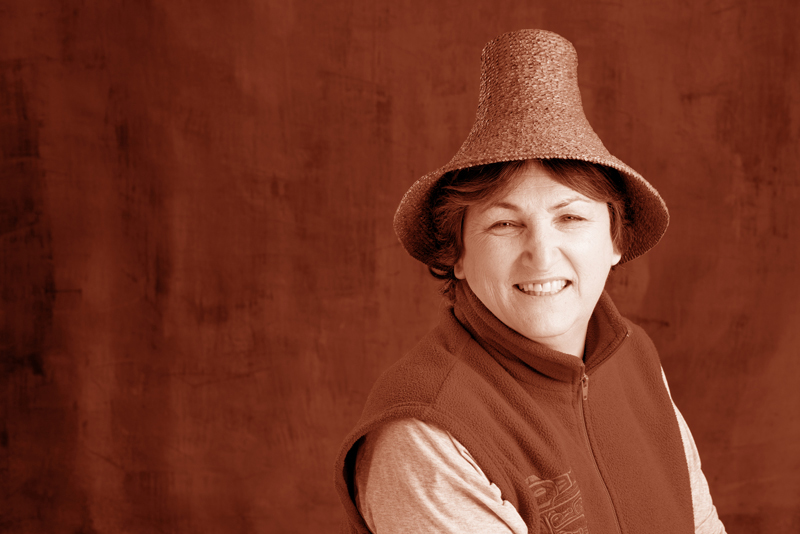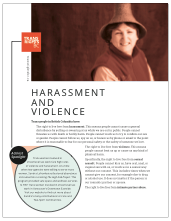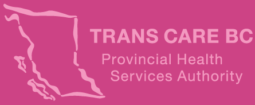Update: For information regarding the addition of Gender Identity and Expression to the 2016 BC Human Rights Code, and to the 2017 Canadian Human Rights Act, please visit the Explicit Protection page.

Trans people in British Columbia have:
- The right to live free from harassment. This means people cannot cause a general disturbance by yelling or swearing at us while we are out in public. People cannot threaten us with death or bodily harm. People cannot touch us to try to confirm our sex or gender. People cannot follow us, spy on us, or harass us by phone or email to the point where it is reasonable to fear for our personal safety or the safety of someone we love.
- The right to live free from violence. This means people cannot beat us up or cause us any kind of physical harm.
- Specifically, the right to live free from sexual assault. People cannot kiss us, have oral, anal or vaginal sex with us, or touch us in a sexual way without our consent. This includes times when we cannot give our consent, for example due to drug or alcohol use. It does not matter if the person is our romantic partner or spouse.
- The right to live free from intimate partner abuse.
How can you stand up for your rights if someone physically assaults you?
- Try to remove yourself from the situation or talk the person down.
- If necessary, defend yourself. The Criminal Code allows you to use force to protect yourself or another person from physical assault so long as you act reasonably.
- In determining whether the use of force was reasonable, the courts look at all the circumstances. This includes looking at things like what happened, who was threatening you, how much force you used, whether you had any other options for avoiding the threat, and whether the force you used was reasonable and proportionate to the force being used against you.
- Note that this is not a defence to the use of force against a police officer who is enforcing the law, unless the police officer is acting illegally. Even if a police officer is assaulting you and your life is in danger, it may be better to strategically submit to an attack by police in order to preserve your life. If you can, pay attention to the badge numbers of police officers you deal with. Keep notes about things that happen to you. You may need this information later to file a complaint or to tell your lawyer.
- You can report the crime to the police. See the Reporting a Crime section.
The police will attend if the assault just happened. They will take a statement from you about what happened and try to find the assailant. If the police and the Crown (lawyer for the government) believe that there will probably be a conviction, they will lay charges and the case will go to trial. You will be called to testify. If the assailant is convicted, they will be sentenced. If there is evidence that the assault was motivated by bias, prejudice, or hate against trans people, the judge must take that into account in sentencing the criminal and this should lead to a harsher sentence.
- You can get a peace bond. A peace bond is a set of conditions from a judge that one person must follow, for the protection of another person. Most often, they require one person to have limited or no contact with the person being protected. It is illegal for someone not to follow the orders of a peace bond. You apply for a peace bond by calling the police. You do not need a lawyer, but it is recommended.
- You can sue in civil court. Behaviour that breaks criminal law often violates civil law, as well. Civil law focuses on relations between specific people.
- The first step is to try to resolve the problem informally. If the event was so severe that it would be inappropriate to try to resolve it yourself, you may choose to sue.
- Examples of reasons to sue include mental injury, physical injury, or lost wages because you have to take time off work.
- If you win, your attacker will have to pay you compensation.
- You can sue someone in civil court on your own, or with the help of a lawyer. The best way to find a lawyer who is competent and supportive of the trans community is through word of mouth. Ask your friends, co-workers, doctor, and other people you know if there is someone they would recommend.
- If you experienced violence or harassment from someone like a doctor, lawyer, or other professional, you can report them to their professional licensing body to prevent them from mistreating trans people in the future.
- If you were harassed or assaulted because you are trans at work, where you are renting, or while you are obtaining a public service (for example, in a restaurant) you can file a human rights complaint. The employer/landlord/owner is legally responsible for the actions of their employees/other tenants/service providers, even if they had nothing to do with the assault itself. Whenever you file a human rights complaint, you have to prove that the treatment was because you are trans. It is not enough that you believe that was the reason. See Human Rights Complaint .
Reporting a Crime
While police officers and the courts can be helpful and respectful of trans people, many trans people report having negative experiences. Trans people often report that their concerns are not investigated properly or that they are not treated respectfully. This is especially true if the trans person is also Aboriginal, a person of colour, or a sex worker. Being involved in the criminal justice process can be long and emotionally difficult. These factors can make it difficult to report a crime.
At the same time, reporting a crime has benefits. You can get protection from further harassment or violence from your attacker. Also, your attacker may be less likely to victimize other people if their actions have consequences.
You may wish to discuss your concerns and options with a victim service worker at VictimLinkBC
If you decide to report a crime:
- Call the police or go to the police station in person. Call 911 from most areas in BC if you are in immediate danger. Otherwise, you can find the phone number of your community police station on the Ministry of Justice website. (Note: If your community does not have a municipal police force, report the crime to the RCMP.) You can also have someone you trust call the police on your behalf.
- Keep detailed records about what happened to you. Write down the time, date, location, who was there, and all of the specific details you can remember about what happened. Not only do these details help the police investigate and increase the likelihood that your attacker will be found and convicted, they also increase the likelihood that your complaint will be taken seriously.
- Keep notes about the case number and the name of the officer you spoke with. If you have any questions or concerns, it will be easiest to talk to the same officer. Also, if you need to file a complaint about the officer, you will know their name.
- If the police do not treat you respectfully or do not take your complaint seriously, file a police complaint. For help filing a complaint against the police, call the BC Civil Liberties Association
Immediate support
- VictimLink BC has a phone line staffed by victim services workers who can refer you to the appropriate resources and let you know if there are any benefits available to you under the Crime Victim Assistance Program. Call 1-800-563-0808.
- The Ending Violence Association of BC (hyperlink: endingviolence.org ) has a listing of anti-violence services.
Who can you go to for help?
- For information on immediate crisis support and referrals, call VictimLink BC at 1-800-563-0808. The line is staffed by victim services workers who can refer you to the appropriate resources and let you know if there are any benefits available to you under the Crime Victim Assistance Program.
- For information on finding victim support services near you, check the searchable database of all victim support services maintained by The Ending Violence Association of BC.
- For a free legal assessment of your situation, contact The Catherine White Holman Wellness Centre . Email lawyer@cwhwc.com to book an appointment. CWHWC has a legal clinic for trans and gender diverse people twice a month. There is a waitlist. Clinic lawyers are not able to represent you, but they can give you a list of lawyers who specialize in human rights complaints. If you cannot travel to the Catherine White Holman Wellness Centre, you may be able to set up an appointment by Skype. Another organization called Access Pro Bono has over 75 legal advice clinics throughout the province. Not all Access Pro Bono lawyers will be familiar with trans legal issues. For more information about Access Pro Bono and the programs it offers, or to find a legal advice clinic in your area, go to: accessprobono.caor call: 1-877-762-6664.
- To find a lawyer, call the BC Branch of the Canadian Bar Association at 604-687-3221 or 1-800-663-1919 (Monday to Friday, 8:30am to 4:30pm). They can give you the name of a lawyer who does Human Rights Complaints and Charter cases, and who will have a consultation with you for up to 30 minutes for a fee of $25 plus tax.
- To find the contact information for a lawyer whose name you already know, you can use the Lawyer Lookup tool.
- For help filing a human rights complaint, contact the Human Rights Tribunal. They may also be able to represent you. However, there are rules about what cases the Tribunal takes on. Contact them at 604-775-2000 in the Lower Mainland or 1-888-440-8844 in the rest of BC.
What to expect after you report a crime
You should know that you do not control a criminal complaint. Criminal behaviour is considered a crime against the country of Canada – it is a violation of the general rules of behaviour that all citizens are expected to obey in order to have a safe, orderly society. Once the crime is reported, the police take over. They make the decisions about how and when to investigate the complaints that are made.
- The police will gather information from you. They may write the information into a report and ask you to sign it. This is called ‘making a statement.’ Carefully read the statement, or have it read to you, before you sign it. Ask for a copy of the statement. The police may also ask questions or get statements from witnesses and any other people involved.
- Ask for the police officer’s name and number for your own records. Also, ask for the file numbers of the police report.
- If you are still in danger and need protection, tell the police. You may need to make a plan to keep yourself safe.
- The police review the evidence and decide whether there is enough evidence to recommend that Crown counsel lay charges. If the crime is severe and there is enough evidence, they may arrest the accused. Not everyone who is charged gets arrested. The arrest may be temporary or last until a trial.
- Crown counsel reviews the information provided by the police. They decide whether or not to lay charges, what the charges will be, or if an alternative to the court system is appropriate. Crown Counsel only lays charges if they believe they can prove that it is beyond a reasonable doubt that the person committed the crime. This is a very high standard. If charges are not laid, it does not necessarily mean that the police or the Crown Counsel don’t believe you. It just means that they don’t think they can prove your case to the very high standard required by the law.
- If charges are laid, there may be many hearings before a trial. The purpose of the hearings could be to request more time, request more information, enter a guilty or not guilty plea, or figure out if there is enough evidence for a trial to be held.
- At the trial, a judge listens to all the evidence. Your side must prove beyond a reasonable doubt that the other person is guilty. You and other witnesses will likely be asked to testify. The other side can then question you.
- The judge will decide if the person is guilty. If the person is found guilty, they will be given a punishment called a sentence. A judge has a lot of discretion about how to deal with the accused. For example, the judge can order that person to stay away from you, to do community service, to be on probation, to spend time in jail, or any combination of these depending on the seriousness of the offence.
- If the person is found guilty, they can appeal the decision.
Resources:
- The Human Rights Complaint Process for Transgender People in BC by barbara findlay, QC. Free download here
- Making a Complaint Against the Police by the BC Civil Liberties Association.




